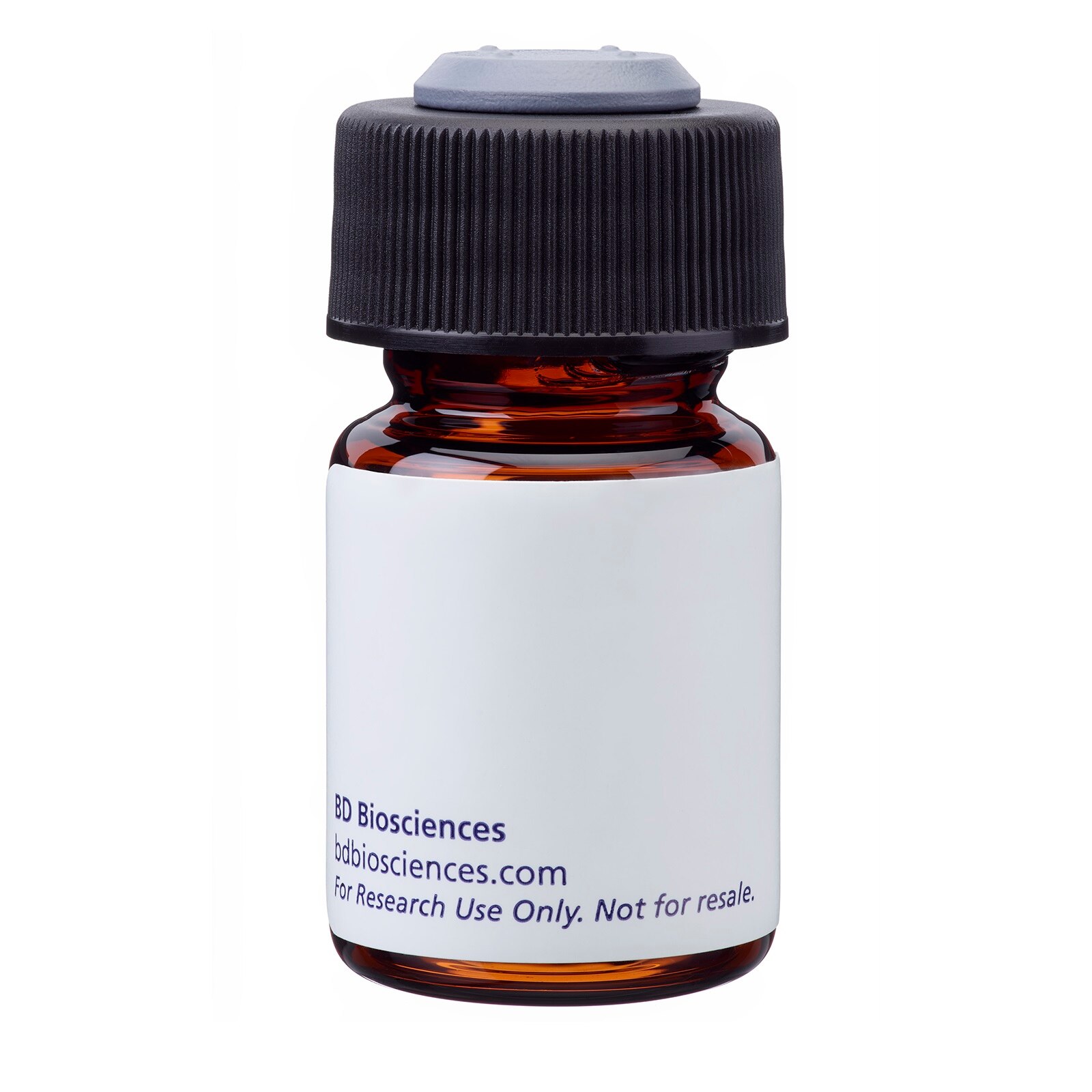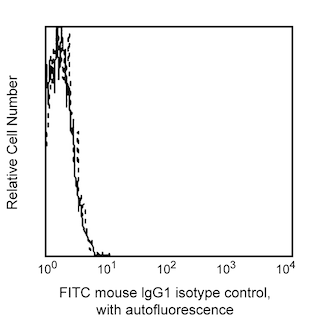Old Browser
This page has been recently translated and is available in French now.
Looks like you're visiting us from {countryName}.
Would you like to stay on the current country site or be switched to your country?




Flow cytometric analysis of CLIP expression on T2DR3 cell line. T2DR3 cells were stained with either FITC Mouse Anti-Human CLIP (Cat. No. 555981; solid line histogram) or FITC Mouse IgG1, κ Isotype Control (Cat. No. 555748; dashed line histogram). Fluorescent histograms were derived from gated events with the side and forward light-scattering events of viable cells. Flow cytometry was performed on a BD FACScan™ system.


BD Pharmingen™ FITC Mouse Anti-Human CLIP

Regulatory Status Legend
Any use of products other than the permitted use without the express written authorization of Becton, Dickinson and Company is strictly prohibited.
Preparation And Storage
Product Notices
- This reagent has been pre-diluted for use at the recommended Volume per Test. We typically use 1 × 10^6 cells in a 100-µl experimental sample (a test).
- An isotype control should be used at the same concentration as the antibody of interest.
- Caution: Sodium azide yields highly toxic hydrazoic acid under acidic conditions. Dilute azide compounds in running water before discarding to avoid accumulation of potentially explosive deposits in plumbing.
- Source of all serum proteins is from USDA inspected abattoirs located in the United States.
- For fluorochrome spectra and suitable instrument settings, please refer to our Multicolor Flow Cytometry web page at www.bdbiosciences.com/colors.
- Please refer to www.bdbiosciences.com/us/s/resources for technical protocols.
Companion Products



The CerCLIP monoclonal antibody specifically recognizes the class II associated invariant chain peptides (CLIP). CLIP is the remaining segment of class II invariant chain (Ii) after proteolytic degradation which stays associated with HLA-DR and represents a final intermediate in the removal of invariant chain from class II molecules during antigen processing. The removal of CLIP and subsequent loading of the antigenic peptide is facilitated by the non-classical class II molecule HLA-DM. CLIP can be detected, in association with HLA-DR, on the surface of T2DR3, a mutant cell line lacking HLA-DM.

Development References (6)
-
Denzin LK, Cresswell P. HLA-DM induces CLIP dissociation from MHC class II alpha beta dimers and facilitates peptide loading. Cell. 1995; 82(1):155-165. (Biology). View Reference
-
Denzin LK, Hammond C, Cresswell P. HLA-DM interactions with intermediates in HLA-DR maturation and a role for HLA-DM in stabilizing empty HLA-DR molecules. J Exp Med. 1996; 184(186):2153-2165. (Biology). View Reference
-
Denzin LK, Robbins NF, Carboy-Newcomb C, Cresswell P. Assembly and intracellular transport of HLA-DM and correction of the class II antigen-processing defect in T2 cells. Immunity. 1994; 1(7):595-606. (Biology). View Reference
-
Kropshofer H, Hämmerling GJ, Vogt AB. How HLA-DM edits the MHC class II peptide repertoire: survival of the fittest. Immunol Today. 1997; 18(2):77-82. (Biology). View Reference
-
Riberdy JM, Avva RR, Geuze HJ, Cresswell P. Transport and intracellular distribution of MHC class II molecules and associated invariant chain in normal and antigen-processing mutant cell lines. J Cell Biol. 1994; 125(126):1225-1237. (Biology). View Reference
-
Riberdy JM, Newcomb JR, Surman MJ, Barbosa JA, Cresswell P. HLA-DR molecules from an antigen-processing mutant cell line are associated with invariant chain peptides. Nature. 1992; 360(6403):474-477. (Biology). View Reference
Please refer to Support Documents for Quality Certificates
Global - Refer to manufacturer's instructions for use and related User Manuals and Technical data sheets before using this products as described
Comparisons, where applicable, are made against older BD Technology, manual methods or are general performance claims. Comparisons are not made against non-BD technologies, unless otherwise noted.
For Research Use Only. Not for use in diagnostic or therapeutic procedures.
Report a Site Issue
This form is intended to help us improve our website experience. For other support, please visit our Contact Us page.